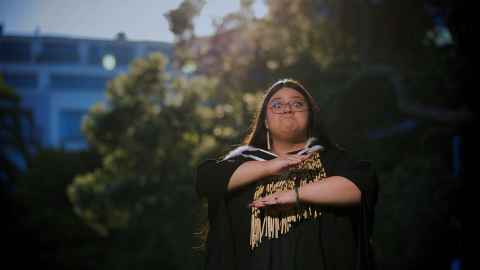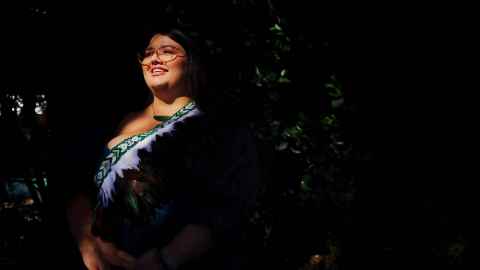Graduate's vision for inclusivity and professorship
9 May 2024
Antonia Tangatakino-McIntyre has found positive ways to bridge two worlds to improve her education journey and for all Māori.

Antonia Tangatakino-McIntyre graduated on 8 May with a Bachelor of Arts, a double major in Māori Studies and Sociology.
But it's not the end of the line for Antonia's academic studies. The 23-year-old is now undertaking her Masters in Indigenous Studies.
Antonia (who hails from Ngāti Awa, Tūhoe, Te Whakatōhea, Te Whanau-ā-Apanui, Ngāpuhi, Mangaia, and Rarotonga in the Cook Islands) has a clear mission and says her ultimate goal is to one day become a professor.
“That is once I publish a few papers after the PhD,” she says.
Her long-term ambition is fuelled by what she believes is the marginalisation of Māori within the tertiary education system.
Reflecting on her first year of studies, Antonia recalls feelings of isolation and being underserved as a Māori student which she says was a shared experience among other tauira Māori.
“Sometimes it meant being the only brown person in the room and being expected to answer all things Māori. It meant being uncomfortable, knowing that some of these classrooms weren’t designed for you.”
She says the combination of Māori Studies and Sociology is one step to bridging the gap between two worlds.
“Now my focus is, how do we change that in a way that we’re embracing a te ao Māori style of learning.”

If you're learning about Māori, it's important to be taught by Māori with a te ao Māori worldview.
Her experience is what led her to becoming a mentor for the University’s Toia ki Waipapa programme, a bridging initiative for high-school leavers transitioning to university life.
"It's a free programme available to all high school leavers, even those who have taken a gap year," Antonia says.
"For those from rural areas, coming into this environment can be a major culture shock. That's where we, as mentors and tutors, bridge the gap. I am their tuākana, their university connection, a pillar of support.
Toia ki Waipapa offers high-school students the opportunity to experience university life during summer school and includes a Māori Studies paper.
"It sets the tone for creating a more inclusive environment for future students, which I think we actually need more of. Students should not have to feel like they’re a statistic when entering our doors, or that they’re ticking a diversity box, rather, they are here because they should be.”
In the same year, she was shoulder-tapped to become a tutor for Māori Studies in recognition of her leadership and eagerness for a Mātauranga-based education system.
She says the most important part of her academic journey, is her learning. She shares how papers like, Introduction to te ao Māori, and Contemporary Māori, delve into the Māori ways of knowing and being.
“It's about understanding the whenua, our people, and the narratives that shape Māori identity.”
She emphasises the importance of being taught by Māori with a te ao Māori worldview and welcomes tauiwi (non-Māori) to participate in that learning.
“With recent events and the debate about whether or not we need Māori and Pacific learning spaces, it highlights the need for cultural competency, but is also an invitation to learn about why these spaces exist.”
One teaching style that particularly resonates with Antonia is wānanga, a form of learning characterised by open discussion and shared wisdom.
“It’s the best. Everybody has the opportunity to be heard and valued which can be a stark contrast to the impersonal nature of some Western-based classrooms.”
Her masters degree will explore themes around mana wahine through creative expression, and mātauranga around menstrual periods, or te awa atua. Antonia draws much of her inspiration from being a wahine Māori, and it’s evident in her art – a hobby she accidentally picked up during her studies.
“I want to gauge the understanding of Māori women back in pre-colonial times, and how it compares to wāhine Māori today.”
Antonia is also a member of Ngā Tauira Māori (NTM), the University’s Māori Students Association. She describes the collective as a supportive community, fundamental to her academic success. It’s also where she found her niche for art.
“NTM is a solid foundation for all Māori within our University and has opened so many doors for me. Another plus is we get to connect with Pacific Islands Students Association (PISA), our Pacific equivalent who are right next to us.”
Media contact
Te Rina Triponel | Kaitohutohu Pāpāho Māori
E: te.rina.triponel@auckland.ac.nz